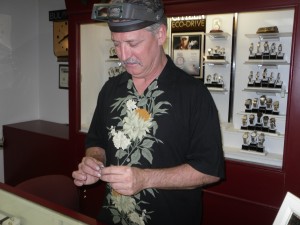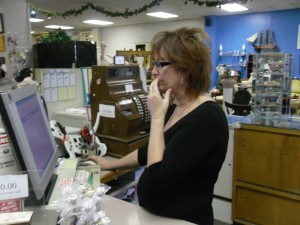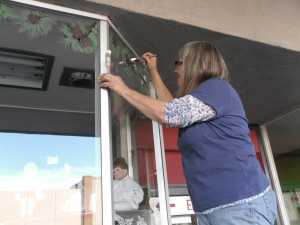EL CENTRO, Calif.—Only fragments of history were left on the floor of Cathy Dobson’s antique store here following the April 2010 7.2-magnitude earthquake. Dobson said she was in shock to see that fine china, glass bookcases, and $300 lamps, among other beloved treasures, had become mere scraps of debris to be fed to the dumpster.

Scott DeVoy, owner of Greens Jewelry in downtown El Centro, Calif., inspects the authenticity of the gems in a ring in November 2011. The independent jewelry store competes against three major jewelry chains at the regional mall. “If I didn’t do service and did just sales, I wouldn’t survive,” he said.— Photo by Stevan Marquez
Business owners in the historic downtown district suffered losses in the hundreds of thousands to damaged merchandise, store closures, and mandatory moving expenses. But the earthquake was only the latest in a series of jolts to rock the 100-year-old downtown area as competition from online retail and a new regional shopping mall wooed away the local customer base. And, then the recession hit.
“For about a year, between the earthquake and the economy, business was terrible,” said Dobson, who owns Dobson’s Antiques on Main St. in downtown El Centro. “There’s a lot of empty buildings and there’s more so now than there was before the earthquake.”
Dobson is one of about 10,000 independent small business owners in the Imperial Valley and one in nearly 28 million nationwide struggling to win back the loyalty of local consumers. But, even a national push to send consumers to Main Street America’s independently owned businesses has not paid off locally.
Sandwiched between Black Friday big-box sales the day after Thanksgiving, and Cyber Monday online deals three days later, is Small Business Saturday, a movement to urge holiday shoppers to buy locally. President Obama offered his support of the day by noting that America’s small businesses “are the backbone of our economy and the cornerstones of our nation’s promise.” And he backed it up on Saturday Nov. 26 by taking his daughters to a locally owned book store in Washington, D.C.

Cathy Dobson, owner of Dobson’s Antiques in El Centro, looks up photos of the earthquake that cost her thousands of dollars in damages. She said despite continuing earthquake and recession recovery, business is starting to pick up for her. — Photo by Stevan Marquez
American Express, the organizer of the second annual Small Business Saturday, reported that Main Street America experienced a surge of shoppers—about 103 million, or 14 million more than what economists were predicting–buying locally on Nov. 26.
But businesses in El Centro apparently didn’t feel the benefits. While Dobson admits that business has been picking up in recent months, Small Business Saturday had virtually no effect on her traffic or sales. “Probably,” she said, “because where we live people aren’t aware of things like that.”
Local business owners fervidly support the message of Small Business Saturday, but for some it wasn’t enough to pay a weekend staff to take a gamble on the day. “We weren’t open that day,” said Paul McManus, owner of Office Supply Co., one of the largest and oldest independent office supply and service companies in the Imperial Valley, who said he couldn’t gauge the local success of the SBS campaign.
McManus is the president of the Imperial Valley Independent Business Alliance, which was founded so messages like that of Small Business Saturday might materialize beyond the hoopla of the holidays. IVIBA’s goal is successful lobbying of local governments and other businesses to consider “bid preferences” for retail and service businesses headquartered in the county, and where profits return.
“Money spent at a locally headquartered firm recirculates in the local economy three times as much as money spent at a local chain store,” McManus wrote in a recent opinion piece responding to the local newspaper’s call for “external stimulus” from outside the valley.

Denise Ryan paints acorns and snow on the windows of Dobson’s Antiques in preparation for the holiday shopping season in downtown El Centro.— Photo by Stevan Marquez
Up until the late 20th century, local businesses relied on other local businesses, consumers shopped locally, and the money stayed in the valley. Today, major chains like Massachusetts-based Staples, Washington-based Costco, Arkansas-based Wal-Mart, and several major department stores at the Imperial Valley Mall generate profits that ultimately do not stay in the valley.
“The consumer level has gone down and gotten much weaker” than it was decades ago, McManus said. “To let downtown survive and thrive would all be up to the local businesses and what plan they decide to put into effect.”

Good work, Stevan!
Very informative and professionally done. I am surprised that an antique store in El Centro can survive and wonder who the clients are and where they’re from.